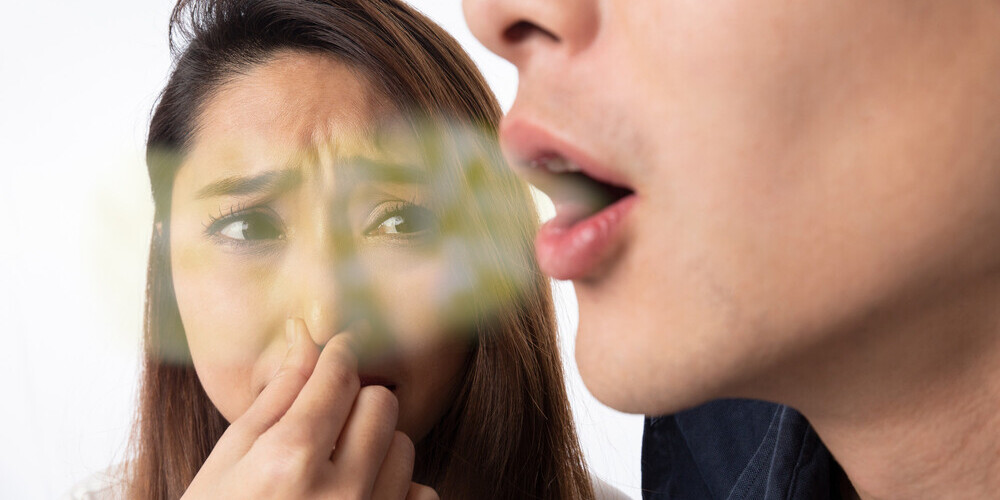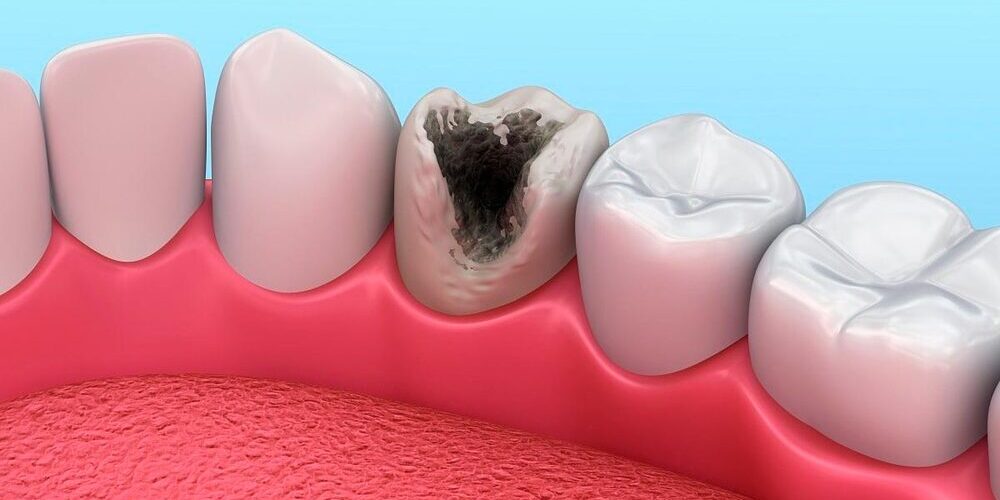
Why Does My Mouth Smell Bad? Reasons for Bad Breath Explained
Ever wondered, “Why does my mouth smell bad?” Bad breath, medically known as halitosis, is a common concern affecting many individuals. Halitosis refers to an unpleasant odor coming from the mouth, often noticed during social interactions or personal conversations.
Understanding bad breath is important for several reasons:
- Social Implications: Bad breath can lead to embarrassment and affect self-confidence.
- Health Indicators: Persistent bad breath might signal underlying health issues.
- Quality of Life: Addressing the causes of halitosis can improve overall well-being.
Common causes of bad breath include:
- Poor Oral Hygiene: Inadequate brushing and flossing leave food particles in the mouth, leading to bacterial growth and unpleasant odors.
- Bacterial Accumulation: Sulfur-producing bacteria thrive on food particles and dead cells in the mouth.
- Dry Mouth (Xerostomia): Reduced saliva production impairs the mouth’s ability to cleanse itself.
- Certain Foods: Garlic, onions, and spices contribute to bad breath through the bloodstream.
- Tobacco Products: Smoking or using tobacco increases risks of gum disease and persistent bad odor.
- Medical Conditions: Health issues like diabetes, respiratory infections, and gastrointestinal disorders can manifest as bad breath.
- Dental Issues: Periodontal disease or untreated cavities create environments for bacteria to flourish.
Understanding these factors helps in identifying effective strategies to combat halitosis, ensuring fresher breath and better health.
Understanding Halitosis
Medical Definition of Halitosis
Halitosis, commonly known as bad breath, is a condition characterized by an unpleasant odor emanating from the mouth. This often results from the presence of volatile sulfur compounds produced by bacteria in the oral cavity. Medical professionals define halitosis as a persistent and noticeable malodor that is not easily masked by conventional means like mints or mouthwash.
Common Misconceptions About Bad Breath
Many people believe that bad breath is always caused by poor oral hygiene. While this is often a significant factor, there are various other causes. Some common misconceptions include:
- Only Certain Foods Cause Bad Breath: Though foods like garlic and onions contribute to bad breath, they are not the sole culprits.
- Mouthwash Can Cure Halitosis: Mouthwash can temporarily mask odors but does not address underlying issues.
- Bad Breath Equals Poor Health: While halitosis can indicate health problems, it does not always mean there is a severe medical condition.
How Halitosis is Diagnosed by Dental Professionals
Dental professionals employ several methods to diagnose halitosis:
- Oral Examination: Dentists thoroughly examine the mouth for signs of decay, gum disease, or other conditions that could contribute to bad breath.
- Halimeter Test: This device measures the concentration of volatile sulfur compounds in the breath.
- Bacterial Swabs: Swabbing areas like the tongue or gums to identify bacterial accumulation and composition.
These diagnostic tools help pinpoint the exact cause of halitosis, enabling targeted treatments to effectively address the issue.
Causes of Bad Breath
1. Poor Oral Hygiene
Regular brushing and flossing are critical for maintaining fresh breath. When oral hygiene practices lapse, food particles linger in the mouth, leading to bacterial growth and stinky breath.
Importance of regular brushing and flossing:
- Using a manual or electric toothbrush at least twice a day helps remove plaque and food debris.
- Flossing daily ensures that particles stuck between teeth are cleared away.
Consequences of neglecting oral hygiene:
- Accumulation of plaque
- Increased risk of cavities and gum disease
- Persistent bad breath
Tips for maintaining good oral health:
- Use fluoride toothpaste for effective cleaning.
- Incorporate an oral care routine with antiseptic mouthwash.
- Replace your toothbrush every three months.
2. Bacterial Accumulation
Sulfur-producing bacteria thrive in the mouth, particularly on the tongue and throat. These bacteria break down proteins, releasing volatile sulfur compounds that cause bad odors.

Role of sulfur-producing bacteria:
- Bacteria feed on food particles and dead cells.
- Sulfur compounds are a byproduct of this breakdown process.
Importance of tongue cleaning in freshening breath:
- Using a tongue scraper or brush reduces bacterial load.
- Regularly cleaning your tongue can significantly improve breath odor.
3. Dry Mouth (Xerostomia)
Dry mouth, or kserostomi, occurs when saliva production decreases, impairing the mouth’s natural cleansing mechanisms.
What causes dry mouth?:
- Certain medications
- Salivary gland disorders
- Habitual mouth breathing
Effects of decreased saliva on oral health and breath:
- Accumulation of bacteria and food debris
- Increased risk for tooth decay and gum disease
Remedies for managing dry mouth:
- Stay hydrated by drinking plenty of water.
- Use saliva substitutes or chewing sugar-free gum.
- Avoid alcohol-based mouthwashes.
4. Dietary Factors
Certain foods contribute to bad breath due to their strong odors being absorbed into the bloodstream and expelled through breath.
Foods that contribute to bad breath:
- Garlic
- Onions
- Spices
How food odors are absorbed into the bloodstream:
- Odors from food are metabolized and travel through the blood to the lungs.
Importance of a balanced diet for oral health:
- Eating a variety of fruits and vegetables promotes saliva production.
5. Tobacco Products
Smoking or using tobacco products can lead to persistent bad breath, alongside other health risks.
Impact on oral odor:
- Tobacco leaves residues in the mouth that produce foul smells.
Health risks associated with tobacco use:
- Increased risk of gum disease and oral cancer
How quitting tobacco can improve breath and overall health:
Quitting smoking improves not just your breath but significantly enhances overall health metrics such as lung function and cardiovascular health.
6. Medical Conditions
Various systemic conditions can manifest as bad breath, linking chronic illnesses with oral health issues.
Overview of systemic conditions causing bad breath:
- Diabetes
- Chronic sinusitis
- Gastrointestinal disorders
Managing these underlying conditions is essential in addressing halitosis effectively.
Dental Issues That Can Cause Bad Breath
Untreated cavities and gum disease, known as periodontal disease, play a significant role in causing bad breath. When cavities are left untreated, they become a breeding ground for bacteria. These bacteria produce sulfur compounds that result in foul-smelling breath.

Gum Disease and Halitosis
- Periodontal Disease: This condition leads to the formation of deep pockets between teeth and gums, trapping food particles and bacteria. As these bacteria accumulate, they release toxins that cause persistent bad breath.
- Gum Disease: Inflammation of the gums due to plaque buildup not only damages the supporting structures of teeth but also contributes to unpleasant odors.
Importance of Regular Dental Check-Ups
Regular dental check-ups are crucial in preventing dental-related bad breath. Dentists can identify early signs of cavities and gum disease, providing timely treatment to prevent the progression of these conditions.
- Professional Cleanings: Plaque and tartar that can’t be removed by regular brushing and flossing are effectively cleaned during professional dental visits.
- Preventive Care: Routine check-ups allow for early detection and management of potential issues that could lead to halitosis.
Maintaining good oral health through regular visits to your dentist ensures that any underlying dental issues are addressed promptly, keeping your breath fresh and healthy.
Symptoms Associated with Bad Breath
Bad breath, can be distressing and socially embarrassing. Recognizing the symptoms is the first step toward addressing the issue effectively.
Common Symptoms
Individuals with halitosis often experience:
- Foul odor upon waking: Morning breath is common due to decreased saliva production during sleep, which allows bacteria to thrive.
- Persistent bad taste: This can occur regardless of eating or brushing teeth, indicating bacterial buildup.
- Dry mouth: Reduced saliva flow can lead to a dry, sticky feeling in the mouth, contributing to bad breath.
Situations That Exacerbate Bad Breath
Certain situations can intensify bad breath, including:
- After eating certain foods: Foods like garlic, onions, and spices are well-known culprits. These foods release odors that linger in the bloodstream and are expelled through the lungs.
- During fasting or dieting: Skipping meals reduces saliva production and increases bacterial growth.
- Smoking or tobacco use: These habits leave persistent odors and increase the risk of gum disease.
Understanding these symptoms helps in recognizing and addressing halitosis promptly. Regular monitoring and identifying triggers can significantly improve oral health and social comfort.
Treatment Options for Bad Breath
1. Improving Oral Hygiene Practices
Effective oral hygiene is foundational in combating bad breath. Mastering the best practices for brushing and flossing can make a significant difference:
- Brushing Techniques: Brush at least twice daily using a fluoride toothpaste. Ensure to cover all surfaces of your teeth, including the front, back, and chewing surfaces. Use short, gentle strokes and focus on the gumline, where plaque often accumulates.
- Flossing: Floss daily to remove food particles and plaque from between your teeth, areas that a toothbrush can’t reach. Gently guide the floss between each tooth and form a ‘C’ shape around the base of each tooth.
- Tongue Cleaning: Utilize a tongue scraper or brush your tongue to eliminate bacteria and food debris that contribute to bad breath.
2. Addressing Dry Mouth
Dry mouth can exacerbate bad breath by reducing saliva production, which is essential for cleansing the mouth. Here are some solutions:
- Hydration: Drink plenty of water throughout the day to keep your mouth moist.
- Saliva Substitutes: Use over-the-counter saliva substitutes or mouth rinses designed for dry mouth.
- Chewing Gum: Opt for sugar-free gum or mints containing xylitol to stimulate saliva production.
3. Dietary Adjustments
Your diet plays a crucial role in maintaining fresh breath. Consider these recommendations:
- Foods That Freshen Breath: Include crunchy fruits and vegetables like apples, carrots, and celery in your diet. These foods help produce saliva and mechanically clean your teeth.
- Foods To Avoid: Limit intake of foods known to cause bad breath such as garlic, onions, spicy foods, and certain fish.
- Balanced Diet: A balanced diet rich in vitamins and minerals supports overall oral health. Incorporating probiotics may also help balance oral bacteria.
4. Regular Dental Visits
Regular dental check-ups are vital for diagnosing and treating underlying issues that contribute to halitosis:
- Professional Cleanings: Dental professionals can provide thorough cleanings to remove plaque and tartar buildup that regular brushing can’t eliminate.
- Dental Exams: Routine exams help identify cavities, gum disease, or other dental problems early on.
- Personalized Advice: Your dentist can offer tailored advice on maintaining oral hygiene based on your specific needs.
Prioritizing these treatment options not only helps combat bad breath but also enhances overall oral health.
Maintaining good oral health is crucial for a variety of reasons, one of which is preventing bad breath. The importance of oral care cannot be overstated when it comes to overall well-being.
Connection Between Oral Health and Overall Well-Being
- General Health: Poor oral hygiene can lead to serious health issues, including heart disease, diabetes, and respiratory infections. The mouth acts as a gateway to the rest of your body; thus, keeping it clean helps in averting these complications.
- Self-Esteem: Bad breath can negatively impact social interactions and self-confidence. Addressing oral hygiene can significantly improve your quality of life by eliminating embarrassing moments.
Benefits of Maintaining Good Dental Hygiene Practices
- Reduces Bacterial Growth: Regular brushing and flossing help remove food particles and plaque from your teeth, reducing the buildup of sulfur-producing bacteria that cause bad breath.
- Prevents Gum Disease: Healthy gums are less likely to harbor bacteria that produce foul odors. Good oral hygiene practices prevent gum diseases like gingivitis and periodontitis.
- Promotes Fresh Breath: Simple habits such as tongue cleaning and using mouthwash can keep your breath fresh by eliminating bacteria and food debris from hard-to-reach areas.
Improving oral hygiene practices not only combats bad breath but also enhances your overall health. By prioritizing dental care, you ensure a healthier mouth and a more confident you.
Conclusion
Understanding the underlying reasons behind bad breath is crucial for maintaining both your oral and overall health. Addressing the root causes of bad breath helps to improve not just your confidence but also your general well-being.
- Prioritize Oral Health: Adopting good dental hygiene practices, such as regular brushing and flossing, can significantly reduce the risk of bad breath.
- Seek Professional Advice: Regular visits to a dental professional ensure that any underlying issues are promptly addressed, aiding in the prevention of bad breath.
By focusing on comprehensive oral care and making informed lifestyle choices, you can enjoy fresher breath and better health.
Visit FineUp Clinic for Professional Dental Care
Are you in search of personalized dental care and expert consultation? Look no further than FineUp Clinic. Our professional team is dedicated to providing top-quality dental services to ensure your oral health is in the best condition. From dealing with bad breath to needing a comprehensive dental check-up, we have you covered.
We also understand that certain foods can negatively impact your dental health. For instance, do bread and pasta cause tooth decay? Our blog explores this subject in detail, providing valuable insights into how such foods can weaken tooth enamel and lead to decay.
Additionally, if you’re a parent wondering about choosing the right toothpaste for your children, we have resources available. Our article on fluoride and fluorine provides significant differences between these two elements and their implications on children’s toothpaste.
Visit FineUp Clinic today for an appointment. Let’s work together to achieve fresher breath and a healthier smile!
FAQs (Frequently Asked Questions)
What is bad breath and how is it defined?
Bad breath, also known as halitosis, refers to an unpleasant odor emanating from the mouth. Understanding bad breath is significant as it can affect social interactions and self-esteem. Common causes include poor oral hygiene, dietary factors, and medical conditions.
What are the common causes of halitosis?
Common causes of halitosis include poor oral hygiene, bacterial accumulation in the mouth, dry mouth (xerostomia), certain dietary choices like garlic and onions, tobacco use, and various medical conditions such as diabetes.
How can I improve my oral hygiene to combat bad breath?
Improving oral hygiene involves regular brushing and flossing, cleaning your tongue, and using mouthwash. It’s important to maintain a consistent oral care routine to prevent bacteria buildup that leads to bad breath.
What role does dry mouth play in causing bad breath?
Dry mouth occurs when there is a decrease in saliva production. Saliva helps wash away food particles and bacteria; thus, a lack of it can lead to bacterial growth and subsequently bad breath. Remedies include staying hydrated and using saliva substitutes.
Can dietary choices affect my breath?
Yes, certain foods like garlic and onions can contribute to bad breath as their odors are absorbed into the bloodstream and expelled through the lungs. Maintaining a balanced diet with fresh fruits and vegetables can help promote fresher breath.
Why is it important to visit a dental professional for bad breath?
Regular dental visits are crucial because dental professionals can diagnose underlying issues such as cavities or gum disease that may be contributing to halitosis. They can provide tailored treatment options to improve your oral health and freshen your breath.
